外研版英语七年级下Module 8 Story time Unit 3 Language in use课件(29张PPT无素材)
文档属性
| 名称 | 外研版英语七年级下Module 8 Story time Unit 3 Language in use课件(29张PPT无素材) |
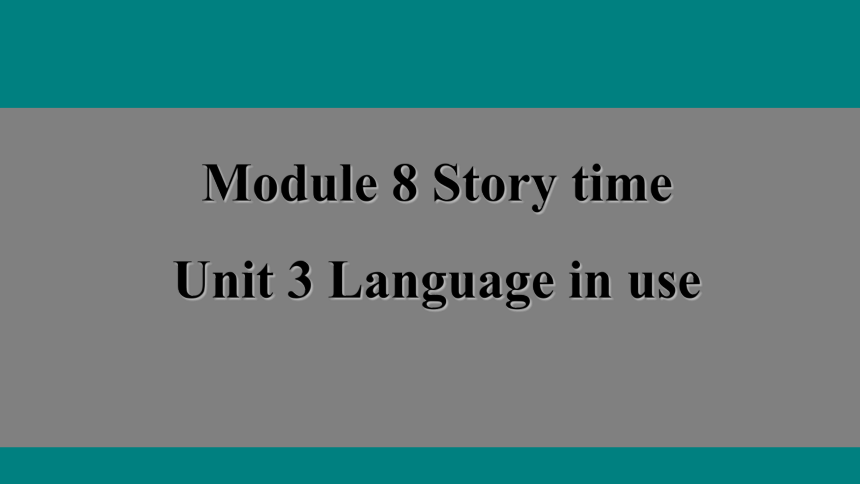
|
|
| 格式 | pptx | ||
| 文件大小 | 2.9MB | ||
| 资源类型 | 教案 | ||
| 版本资源 | 外研版 | ||
| 科目 | 英语 | ||
| 更新时间 | 2021-12-12 22:06:12 | ||
图片预览

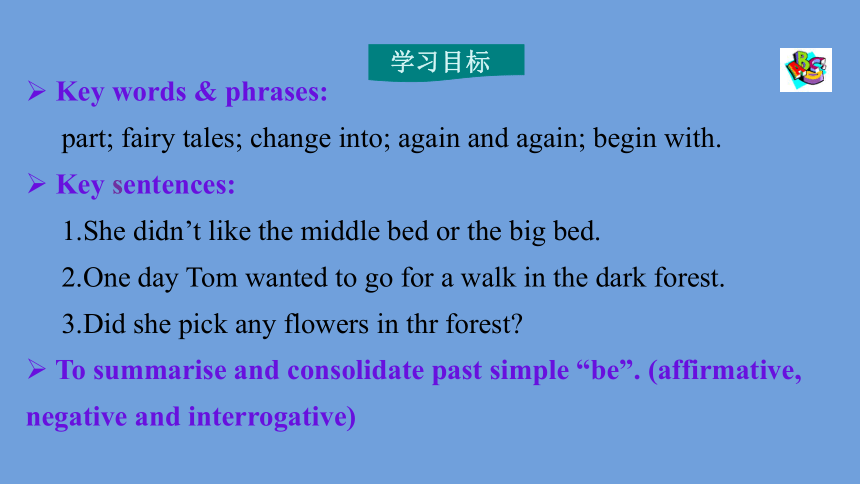
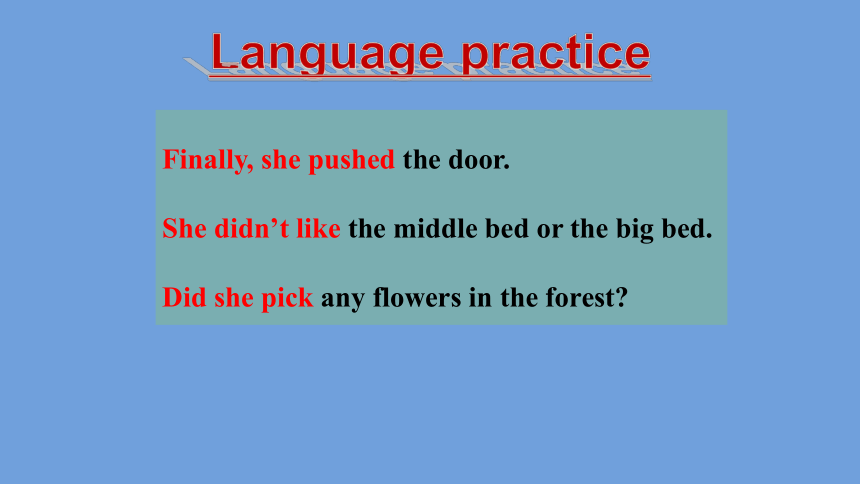

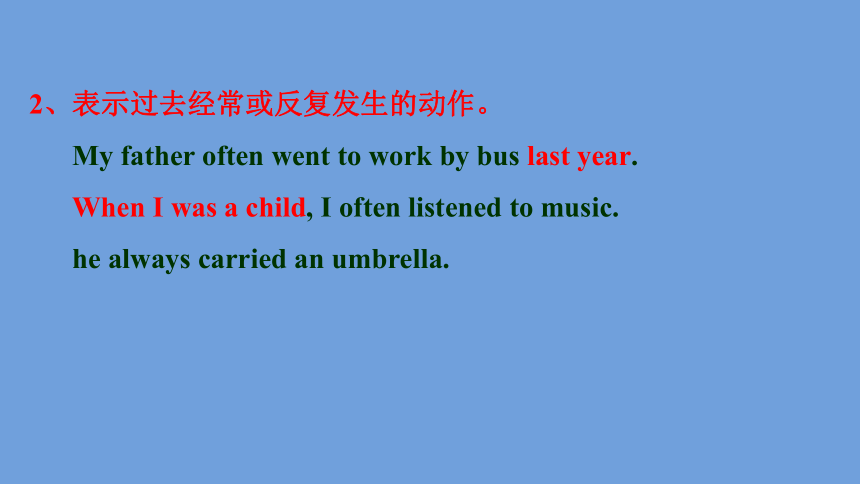
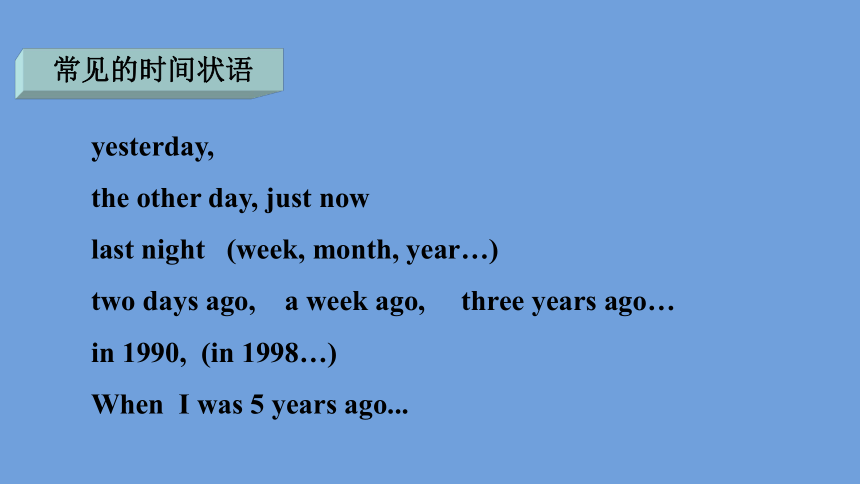

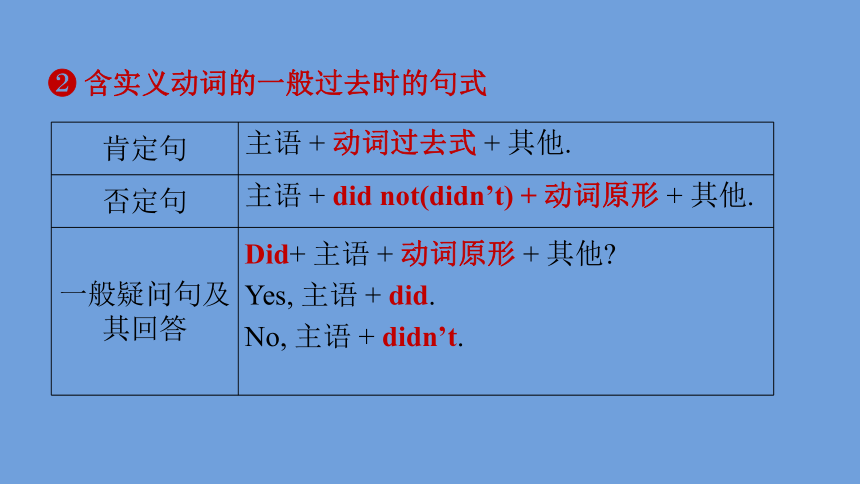
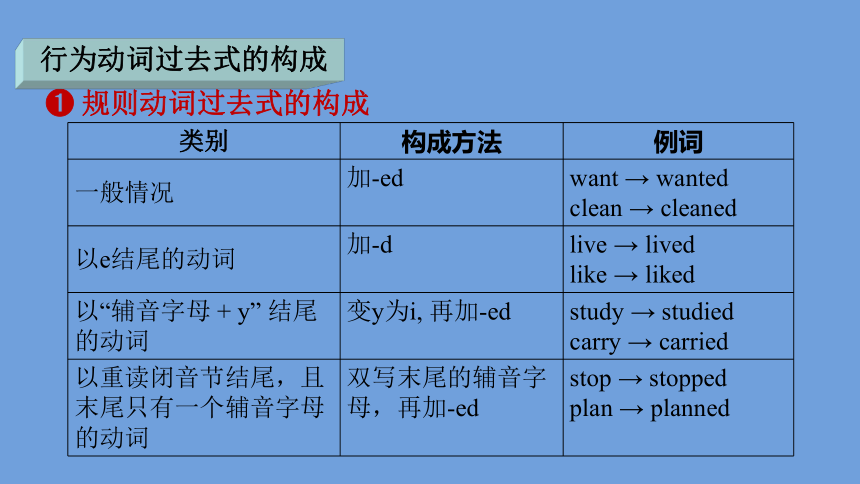
文档简介
(共29张PPT)
Module 8 Story time
Unit 3 Language in use
学习目标
Key words & phrases:
part; fairy tales; change into; again and again; begin with.
Key sentences:
1.She didn’t like the middle bed or the big bed.
2.One day Tom wanted to go for a walk in the dark forest.
3.Did she pick any flowers in thr forest
To summarise and consolidate past simple “be”. (affirmative, negative and interrogative)
Language practice
Finally, she pushed the door.
She didn’t like the middle bed or the big bed.
Did she pick any flowers in the forest
Grammar
一般过去时的用法
1、表示过去某个时间发生的动作或存在的状态。
He was at home yesterday.
I got up at six thirty yesterday morning.
I visited my aunt last weekend.
2、表示过去经常或反复发生的动作。
My father often went to work by bus last year.
When I was a child, I often listened to music.
he always carried an umbrella.
常见的时间状语
yesterday,
the other day, just now
last night (week, month, year…)
two days ago, a week ago, three years ago…
in 1990, (in 1998…)
When I was 5 years ago...
一般过去时的句式
含be动词的一般过去时的句式
肯定句 主语 + was/were + 其他.
否定句 主语 + was not( wasn’t)/were not( weren’t) + 其他.
一般疑问句及其回答 Was/Were + 主语 + 其他
Yes, 主语 + was/were.
No, 主语 + wasn’t/weren’t.
含实义动词的一般过去时的句式
肯定句 主语 + 动词过去式 + 其他.
否定句 主语 + did not(didn’t) + 动词原形 + 其他.
一般疑问句及其回答 Did+ 主语 + 动词原形 + 其他
Yes, 主语 + did.
No, 主语 + didn’t.
类别 构成方法 例词
一般情况 加-ed want → wanted
clean → cleaned
以e结尾的动词 加-d live → lived
like → liked
以“辅音字母 + y” 结尾的动词 变y为i, 再加-ed study → studied
carry → carried
以重读闭音节结尾,且末尾只有一个辅音字母的动词 双写末尾的辅音字 母,再加-ed stop → stopped
plan → planned
规则动词过去式的构成
行为动词过去式的构成
【特别提醒】
(1) 在清辅音后,-ed 读/t/。如walked /w kt/, stopped /st pt/。
(2) 在元音或浊辅音后,-ed读/d/。如lived /livd/,enjoyed / n d d/。
(3) 在/t/和/d/后,-ed读/id/。 如studied /st did/.
类别 例词
过去式和原形一样
let → let cut → cut put → put
中间元音变化 i—a begin → began sing → sang swim → swam
ring → rang sit → sat give → gave
drink → drank
i—o drive → drove ride → rode write → wrote
o/a—e grow → grew know → knew
throw → threw draw → drew
不规则动词过去式的构成
类别 例词
过去式以ought和aught结尾 buy → bought think → thought
bring → brought catch →caught
teach → taught
结尾的d变为t build →built lend →lent
send →sent spend →spent
含有双写字母的词,将双写改为单写,在词尾加t keep → kept sleep → slept
sweep → swept feel → felt
answer enter hurry jump like notice point return try
1. Complete the sentences with the correct form of the words
from the box.
1. Baby Bear _______ at the girl in his bed.
2. She _______ the house.
3. Goldilocks _______ out of bed.
4. She _______ to the little house.
pointed
entered
jumped
hurried
5. The Three Bears didn’t _______ the door because they were out in the forest.
6. The Three Bears didn’t ______ Goldilocks in bed at first.
7. Goldilocks didn’t ______ to that part of the forest again.
8. — Did she ___ the small chair first
— No, she didn’t. She tried the big chair first.
9. — Did she ____ the small bed
— Yes, she did.
answer
notice
return
try
like
2. Complete the passage with the correct form of the words from
the box.
answer ask be enter knock
look notice pick walk want
Once upon a time there was a small boy called Tom. One day Tom _______to go for a walk in the dark forest. He _____ for a short time and then he _______some flowers. Next, he _____ a little house. He ________ on the door but nobody _______ . He _______ the house.
wanted
walked
picked
noticed
knocked
answered
entered
There____ a big table, a big chair, a big bowl and a big bear. Then Tom _____ at the bowl of food with big eyes. The bear _____ Tom,“Are you hungry Try some of my food.” Tom tried the food. Then they were good friends.
was
looked
asked
Now work in pairs. Ask and answer the questions.
1. Did Tom want to go for a walk in the dark forest
2. Did he pick a lot of blue flowers
3. Did he notice a house
4. Did he knock on the door first
Yes ,he did.
No ,he didn’t.
Yes ,he did.
Yes ,he did.
Around the world
All around the world mothers tell their children Fairy tales. The stories are exciting and children enjoy listening to them again and again. The stories often include animals that can speak or people who change into animals. The stories always begin with “Once upon a time….”
Fairy tales
Module task: Telling a sory
3. Work in pairs. Look at the pictures and make sentences. Use the words given.
The father loved the little girl.
The father and little girl played games in the garden.
The little girl fell off the boat and died in the sea.
She changed into a bird.
Her father watched the bird and felt sad.
The bird decided to fill the sea with the stones.
4. Put the sentences together to make a story. Remember to
use words like and, so, but, because, first, next, then and finally.
Once upon a time, there was a little girl called Nuwa. Her father was Emperor Yan and he loved ...
Sample Writing
Once upon a time, there was a little girl called Nuwa. Her father was Emperor Yan and he loved her very much. He often played with his daughter and they had a great time. One day, Nuwa went boating in the sea and fell into the sea and died because the sea was very rough. Nuwa changed into a beautiful bird after death. His father watched the bird and felt very sad. Nuwa decided to fill the sea with stones.
5. Read your story to another pair and listen to theirs.
Let’s share!
Exercises
一、用方框中的词的适当形式填空。
1.He _______ interested in playing the piano last year.
2. I jumped when I heard the ________ news.
3. _______, she decided to go shopping with Sally.
4. My grandfather ________ three years ago.
5. You are ________ of my life.
part, final, become, exciting, die
became
exciting
Finally
died
part
二、根据汉语意思完成句子。
1. 昨天我们班一些同学去了博物馆。
_____ _____ the students in our class went to the museum yesterday.
2. 他们只在中国待很短一段时间。
They only stay in China ____ ___ ______ _____.
3. 上课时我们应当认真听老师讲课。
We should ________ _____ the teacher carefully in class.
4. 汤姆反复地读这本书。
Tom read this book _______ _____ _______.
5. 许多老故事都是以“很久很久以前……”开始的。
Many old stories _________ _______ “Long long ago. . . ”.
Some of
for a short time
listen to
again and again
begin with
Homework
Preview Module 9 Unit 1.
Do the exercises in students’ book.
Thank you!
Module 8 Story time
Unit 3 Language in use
学习目标
Key words & phrases:
part; fairy tales; change into; again and again; begin with.
Key sentences:
1.She didn’t like the middle bed or the big bed.
2.One day Tom wanted to go for a walk in the dark forest.
3.Did she pick any flowers in thr forest
To summarise and consolidate past simple “be”. (affirmative, negative and interrogative)
Language practice
Finally, she pushed the door.
She didn’t like the middle bed or the big bed.
Did she pick any flowers in the forest
Grammar
一般过去时的用法
1、表示过去某个时间发生的动作或存在的状态。
He was at home yesterday.
I got up at six thirty yesterday morning.
I visited my aunt last weekend.
2、表示过去经常或反复发生的动作。
My father often went to work by bus last year.
When I was a child, I often listened to music.
he always carried an umbrella.
常见的时间状语
yesterday,
the other day, just now
last night (week, month, year…)
two days ago, a week ago, three years ago…
in 1990, (in 1998…)
When I was 5 years ago...
一般过去时的句式
含be动词的一般过去时的句式
肯定句 主语 + was/were + 其他.
否定句 主语 + was not( wasn’t)/were not( weren’t) + 其他.
一般疑问句及其回答 Was/Were + 主语 + 其他
Yes, 主语 + was/were.
No, 主语 + wasn’t/weren’t.
含实义动词的一般过去时的句式
肯定句 主语 + 动词过去式 + 其他.
否定句 主语 + did not(didn’t) + 动词原形 + 其他.
一般疑问句及其回答 Did+ 主语 + 动词原形 + 其他
Yes, 主语 + did.
No, 主语 + didn’t.
类别 构成方法 例词
一般情况 加-ed want → wanted
clean → cleaned
以e结尾的动词 加-d live → lived
like → liked
以“辅音字母 + y” 结尾的动词 变y为i, 再加-ed study → studied
carry → carried
以重读闭音节结尾,且末尾只有一个辅音字母的动词 双写末尾的辅音字 母,再加-ed stop → stopped
plan → planned
规则动词过去式的构成
行为动词过去式的构成
【特别提醒】
(1) 在清辅音后,-ed 读/t/。如walked /w kt/, stopped /st pt/。
(2) 在元音或浊辅音后,-ed读/d/。如lived /livd/,enjoyed / n d d/。
(3) 在/t/和/d/后,-ed读/id/。 如studied /st did/.
类别 例词
过去式和原形一样
let → let cut → cut put → put
中间元音变化 i—a begin → began sing → sang swim → swam
ring → rang sit → sat give → gave
drink → drank
i—o drive → drove ride → rode write → wrote
o/a—e grow → grew know → knew
throw → threw draw → drew
不规则动词过去式的构成
类别 例词
过去式以ought和aught结尾 buy → bought think → thought
bring → brought catch →caught
teach → taught
结尾的d变为t build →built lend →lent
send →sent spend →spent
含有双写字母的词,将双写改为单写,在词尾加t keep → kept sleep → slept
sweep → swept feel → felt
answer enter hurry jump like notice point return try
1. Complete the sentences with the correct form of the words
from the box.
1. Baby Bear _______ at the girl in his bed.
2. She _______ the house.
3. Goldilocks _______ out of bed.
4. She _______ to the little house.
pointed
entered
jumped
hurried
5. The Three Bears didn’t _______ the door because they were out in the forest.
6. The Three Bears didn’t ______ Goldilocks in bed at first.
7. Goldilocks didn’t ______ to that part of the forest again.
8. — Did she ___ the small chair first
— No, she didn’t. She tried the big chair first.
9. — Did she ____ the small bed
— Yes, she did.
answer
notice
return
try
like
2. Complete the passage with the correct form of the words from
the box.
answer ask be enter knock
look notice pick walk want
Once upon a time there was a small boy called Tom. One day Tom _______to go for a walk in the dark forest. He _____ for a short time and then he _______some flowers. Next, he _____ a little house. He ________ on the door but nobody _______ . He _______ the house.
wanted
walked
picked
noticed
knocked
answered
entered
There____ a big table, a big chair, a big bowl and a big bear. Then Tom _____ at the bowl of food with big eyes. The bear _____ Tom,“Are you hungry Try some of my food.” Tom tried the food. Then they were good friends.
was
looked
asked
Now work in pairs. Ask and answer the questions.
1. Did Tom want to go for a walk in the dark forest
2. Did he pick a lot of blue flowers
3. Did he notice a house
4. Did he knock on the door first
Yes ,he did.
No ,he didn’t.
Yes ,he did.
Yes ,he did.
Around the world
All around the world mothers tell their children Fairy tales. The stories are exciting and children enjoy listening to them again and again. The stories often include animals that can speak or people who change into animals. The stories always begin with “Once upon a time….”
Fairy tales
Module task: Telling a sory
3. Work in pairs. Look at the pictures and make sentences. Use the words given.
The father loved the little girl.
The father and little girl played games in the garden.
The little girl fell off the boat and died in the sea.
She changed into a bird.
Her father watched the bird and felt sad.
The bird decided to fill the sea with the stones.
4. Put the sentences together to make a story. Remember to
use words like and, so, but, because, first, next, then and finally.
Once upon a time, there was a little girl called Nuwa. Her father was Emperor Yan and he loved ...
Sample Writing
Once upon a time, there was a little girl called Nuwa. Her father was Emperor Yan and he loved her very much. He often played with his daughter and they had a great time. One day, Nuwa went boating in the sea and fell into the sea and died because the sea was very rough. Nuwa changed into a beautiful bird after death. His father watched the bird and felt very sad. Nuwa decided to fill the sea with stones.
5. Read your story to another pair and listen to theirs.
Let’s share!
Exercises
一、用方框中的词的适当形式填空。
1.He _______ interested in playing the piano last year.
2. I jumped when I heard the ________ news.
3. _______, she decided to go shopping with Sally.
4. My grandfather ________ three years ago.
5. You are ________ of my life.
part, final, become, exciting, die
became
exciting
Finally
died
part
二、根据汉语意思完成句子。
1. 昨天我们班一些同学去了博物馆。
_____ _____ the students in our class went to the museum yesterday.
2. 他们只在中国待很短一段时间。
They only stay in China ____ ___ ______ _____.
3. 上课时我们应当认真听老师讲课。
We should ________ _____ the teacher carefully in class.
4. 汤姆反复地读这本书。
Tom read this book _______ _____ _______.
5. 许多老故事都是以“很久很久以前……”开始的。
Many old stories _________ _______ “Long long ago. . . ”.
Some of
for a short time
listen to
again and again
begin with
Homework
Preview Module 9 Unit 1.
Do the exercises in students’ book.
Thank you!
同课章节目录
- Module 1 Lost and found
- Unit 1 Whose bag is this?
- Unit 2 Are they yours?
- Unit 3 Language in use
- Module 2 What can you do ?
- Unit 1 I can play the piano
- Unit 2 I can run really fast
- Unit 3 Language in use
- Module 3 Making plans
- Unit 1 What are you going to do at the weekends?
- Unit 2 We're going to cheer the players.
- Unit 3 Language in use
- Module 4 Life in the future
- Unit 1 Everyone will study at home
- Unit 2 Every family will have a small plane.
- Unit 3 Language in use
- Module 5 Shopping
- Unit 1 What can I do for you?
- Unit 2 You can buy everything on the Internet
- Unit 3 Language in use
- Module 6 Around town
- Unit 1 Could you tell me how to get to the Nationa
- Unit 2 The London Eye is on your right.
- Unit 3 Language in use
- Revision module A
- Module 7 My past life
- Unit 1 I was born in a small village.
- Unit 2 I was born in Quincy.
- Unit 3 Language in use
- Module 8 Story time
- Unit 1 Once upon a time….
- Unit 2 Goldilocks hurried out of the house.
- Unit 3 Language in use
- Module 9 Life history
- Unit 1 He left school and began work at the age of
- Unit 2 He decided to be an actor.
- Unit 3 Language in use
- Module 10 A holiday journey
- Unit 1 What did you do?
- Unit 2 This morning we took a walk.
- Unit 3 Language in use
- Module 11 Body language
- Unit 1 They touch noses!
- Unit 2 Here are some ways to welcome them.
- Unit 3 Language in use
- Module 12 Western music
- Unit 1 It's so beautiful!
- Unit 2 Vienna is the centre of European classical
- Unit 3 Language in use
- Revision module B
